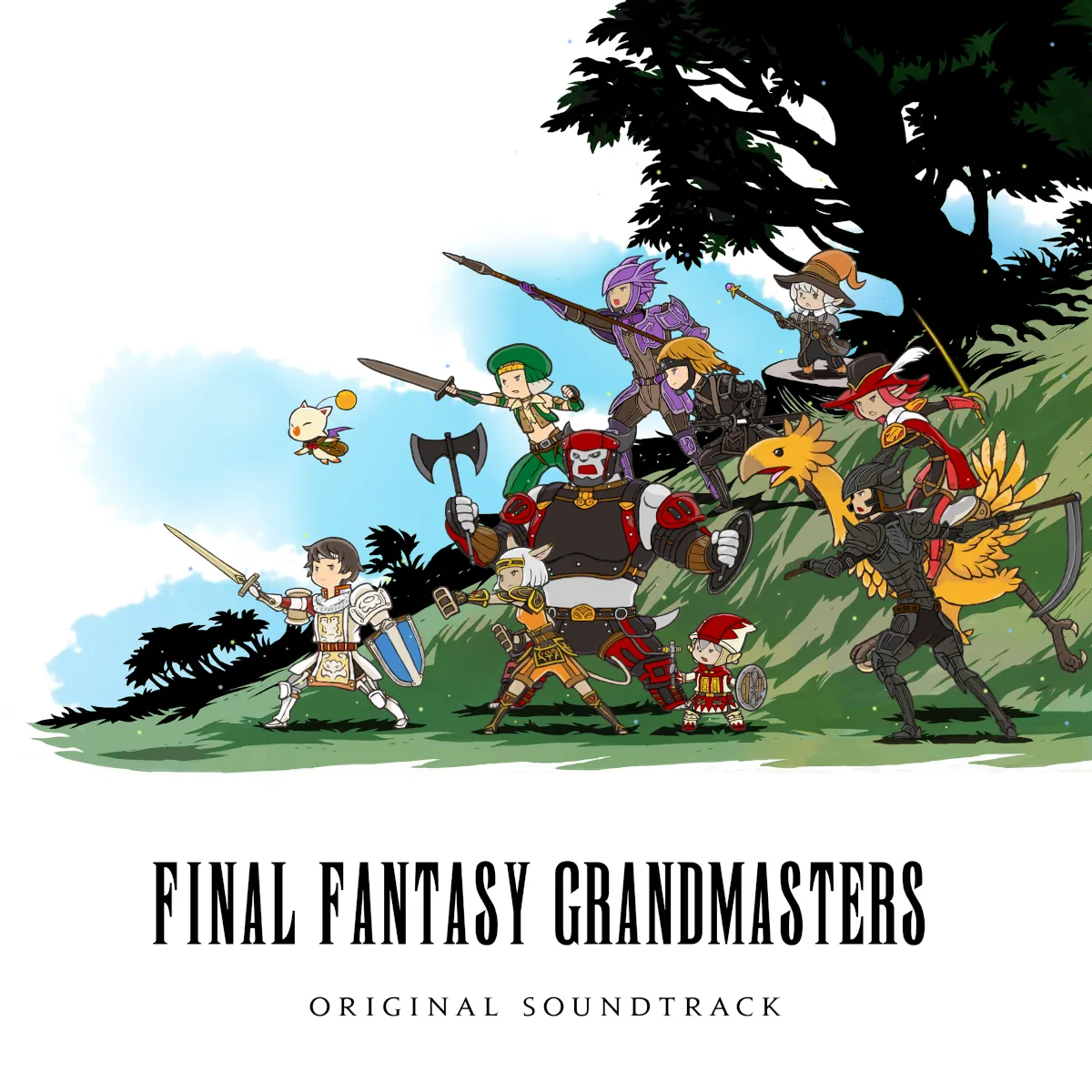What’s this? You say you’ve never heard of Final Fantasy Grandmasters? That’s alright. I’m an avid Final Fantasy XI fan, and even I forgot about this one. Final Fantasy Grandmasters was a Japanese-only mobile phone MMORPG that served as a kind of Final Fantasy XI lite, in preparation for a full mobile port that never came to fruition (code-named Final Fantasy XI R). Grandmasters had its servers open from 2015 to 2019, then shut down to be forgotten forever. Meanwhile, Final Fantasy XI proper marches on, now in its 23rd year.
In 2023, Square Enix decided to publish a digital soundtrack for Grandmasters around the same time they released some other Final Fantasy XI music. In many ways, one might think of this short OST (only 18 minutes in length!) as an extension of Final Fantasy XI. Especially so, given who worked on this project.
The composer? Final Fantasy XI music lead Naoshi Mizuta. The performers? The Final Fantasy XI band Nanaa Mihgo’s. The end result? Something that sounds every bit as good as Nanaa Mihgo’s Final Fantasy XI debut arranged album, Stolen Hearts. This group is a trio, with Naoshi Mizuta on bass and handling all electronic/synth work, Takuro Iga on piano, and the luminary Machi Okabe leading on violin. This trio creates some of the most peppy, vibrant, and bright music I’ve ever heard. The way they can modulate their style to a typical RPG’s needs—combat, towns, dungeons, dramatic scenes—is purely magical.
The Final Fantasy Grandmasters Original Soundtrack opens with “Clash of Wills,” an instantly iconic combat theme that also served as the game’s trailer music at launch. Each instrumentalist takes the opportunity to show off their skills with elaborate improvised solos in this one. But for me, it’s the established rhythm and chord structure that are truly striking. This is, doubtless, my favorite track on the short album.
The “Nanaa Mihgo’s” crew is credited for three other tracks here. Next up is track 2, “Boundless Curiosity.” This one feels like an exploration theme, and is in some ways similar to the airship music in Final Fantasy XI—similar, and better in every way. Okabe’s violin lead is so bright, and Iga’s clever, decorative solos help round out the sound! This one is slightly less interesting than “Clash of Wills” from a compositional standpoint, but the Mihgo’s team keeps it together with their stellar performance!
“Hail, Adventurers!” is the next Mihgo’s jam. This one runs at a moderate tempo and feels a bit like a lively tavern piece, some celebratory music for players to get together and form parties. In moments like these, one wonders how a game that went largely forgotten had such a powerful soundtrack? Then again, we are talking quality over quantity: we’ve hit three of four Mihgo’s tracks already!
The last one, track 5, is “Home Point.” This is the slowest of the tracks, and it features some unexpected sounds: a strumming acoustic guitar and a bandoneon. I imagine both of these are synth, handled by Mizuta. I think this song demonstrates how versatile this team of musicians can be. Later in the song, I noticed some great percussion, including castanets. Being in a slow 6/8 tempo, “Home Point” serves as great rest and relaxation music.
So, those are the Nanaa Mihgo’s tracks. They are the reason I recommend this soundtrack. But what about the rest? Well, tracks 7 through 9 are brief musical jingles. That leaves us with “Opening Theme,” “Never Give In,” and “Ending Theme,” which are fully synthesized works from Naoshi Mizuta. These tracks certainly aren’t bad, but they can’t hold a candle to the full Nanaa Mihgo’s works. “Opening Theme” starts with an original melody, but eventually works its way into one of Mizuta’s “Vana’diel March” themes from Final Fantasy XI, musically tying the two projects together. It’s short, but effective.
“Never Give In” is clearly a major battle theme: perhaps for a raid or boss battle? It reminds me of Mizuta’s work on the Treasures of Aht Urhgan Besieged and Assault events. The music serves its purpose. Finally, the “Ending Theme” does provide a sense of resolution, though I’m not entirely certain how this music presented in the game. Was there a staff roll at some point? How linear was the narrative?
With these last questions, I find myself wanting to wax philosophical regarding the experience of enjoying music to a game that no longer exists. We are increasingly experiencing that with live service titles, as I opined in my NieR Re[in]carnation retrospective piece. As I listen to those soundtracks, as well as Grandmasters, and still others like Final Fantasy Record Keeper, I find myself valuing this music evermore, longing for memories I don’t have and, indeed, will never have, in the form of the now-missing games.
Regarding availability for this soundtrack, it is available on iTunes, but currently it is locked to Japanese regions only. Keep that in mind, should you want to get hold of this special little treat for yourself!




